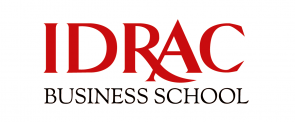About Brand Strategy And Digital Marketing in IDRAC Business School
SKILLS
- Understand the challenges of digital marketing and e-commerce.
- Know how to define objectives, build a marketing plan and manage a campaign.
- Know and use the different digital acquisition levers.
- Measure the performance of its campaign and its marketing actions.
- Animate a community and manage a website.
- Build customer loyalty and exploit data by enhancing DATA.
- Leverage the growth of mobile.
- Choose a suitable and consistent online business model.
GOAL
Today, through various digital media (smartphone, tablet, computer, etc.), digital marketing offers companies and brands the means to generate growth while controlling return on investment and customer relations. This deepening provides the methodologies and techniques necessary to build and steer “digital marketing” strategies.
Teaching modules
Digital strategy
- Design the digital strategy plan
- Inbound marketing, online content policy and strategy
- Management of online advertising campaigns
- Digital law
E-Business and E-Commerce
- Online Business Model
- Omnichannel strategy, challenges of e-commerce and m-commerce
Manage a specialized digital and IT project
- Web techniques and project management
- Dashboards and traffic management
- Practice of HTML and CSS
Customer relations, loyalty and data processing
- Data at the heart of the strategy: Big Data, Smart Data and Open Data
- Mobile marketing and connected objects: acquisition and loyalty tools
Preparation for certifications
- Google Analytics
- Google Adwords
- Hubspot (Inbound)
Professional career & professions
- Digital Marketing Manager
- Web marketer
- Community / Trafic Manager
- Digital Brand Manager
- Digital Strategic Planner
- Digital Marketing Project Manager
Academic qualification equivalents
English language requirements (one of the below):
The tuition fees and expenses at IDRAC Business School in France can vary depending on several factors, including the program of study, the campus location, and the student's nationality. Please note that these figures are approximate and may have changed since my last knowledge update in September 2021. It's essential to verify the most up-to-date information on the school's official website or by contacting the admissions office.
1. Tuition Fees:
Tuition fees at IDRAC Business School in France can vary based on the program and campus. Here's a rough estimate of the annual tuition fees for international students:
- Bachelor's Programs (BBA): Tuition fees for undergraduate programs typically range from approximately €8,000 to €12,000 per year.
- Master's Programs (MBA): Tuition fees for master's programs can vary widely based on the specialization and location. On average, they may range from €10,000 to €16,000 per year.
- Doctor of Business Administration (DBA): The tuition fees for DBA programs tend to be higher, often exceeding €20,000 per year.
It's important to note that some programs may have additional fees for study materials, books, and administrative expenses. Additionally, scholarships and financial aid opportunities may be available to eligible students, so it's advisable to check with the school's financial aid office for details.
2. Living Expenses:
The cost of living in France can vary significantly depending on the city and lifestyle of the student. Major cities like Paris tend to be more expensive than smaller cities. On average, international students can expect to incur the following monthly expenses:
- Accommodation: Rent for student accommodation in France can range from €300 to €800 or more per month, depending on whether you choose to live in university housing, private apartments, or shared accommodations.
- Food: Food expenses can vary, but a rough estimate for monthly groceries and meals at local restaurants is around €200 to €400.
- Transportation: Public transportation costs can vary by city but are typically between €30 to €70 per month.
- Health Insurance: International students are usually required to have health insurance. The cost varies, but it's approximately €200 to €600 per year.
- Miscellaneous: This category includes expenses for mobile phone plans, internet, books, and other personal items. It may amount to around €100 to €200 per month.
3. Visa and Residence Permit:
International students from outside the European Union (EU) and European Economic Area (EEA) may need to obtain a student visa and a residence permit, which may involve additional fees. The cost of visa and permit processing can vary based on nationality and specific requirements.
Please keep in mind that these figures are rough estimates, and actual expenses may vary based on individual circumstances. It's essential to research the specific program you're interested in and contact IDRAC Business School directly for the most accurate and up-to-date information on tuition fees and living expenses. Additionally, consider budgeting for potential fluctuations in currency exchange rates and unexpected expenses.
